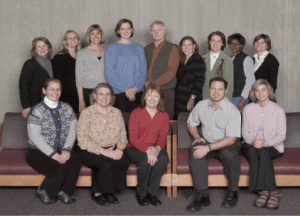Educational programs
The UW School of Nursing has a rich history of educational programs that have evolved to meet society’s health needs.
The doctor of nursing practice
The UW School of Nursing is a pioneer in advanced practice nursing and established the first Doctor of Nursing Practice (DNP) degree program on the west coast in January 2007. More than 500 advanced practice nurses have graduated from the program since it was established.
The DNP is a clinical, or practice, doctorate and differs from the PhD, a research doctorate. The practice doctorate has become the standard not only for nurses but for other health care providers such as physical therapists, pharmacists and physicians.
Washington State was a pace setter and model as other states step forward to support legal autonomy for advanced practice nurses to diagnose and treat illness, prescribe medication, order diagnostic tests and follow their patients over time without supervision. Like other health-care providers today, DNP graduates use a team approach to patient care.
The UW DNP

First DNP cohort
The DNP program was the culmination of increasing complexity in the healthcare system, and the need for primary care nurse practitioners that were both better and differently prepared, said Dr. Marie Annette Brown, the Group Health Endowed Nursing Professor in Chronic Illness Care, and leader of the faculty group that planned and launched the DNP program.
“What started at the UW School of Nursing as a pioneering program on the west coast is today becoming a standard around the country,” Brown said. “Our community and state now recognizes that nurse practitioners will play a vital role in any attempt to provide broader access to healthcare.”
Dr. Brown was the chair of the DNP Coordinating Committee between 2006 and 2009 that developed and implemented the program with the help of her faculty colleagues. She obtained a training grant from the Health Resources and Services Administration to implement the DNP program.
The School of Nursing DNP Committee, along with Dr. Nancy Fugate Woods, then dean of the UW School of Nursing, worked with faculty and the university leadership to create the program using existing resources.
“The DNP program survived by sheer will and commitment of the faculty,” Brown said. “The faculty saw the need for the kind of patient-centric practitioner who was also a leader and change agent that the DNP program would foster. We were determined to educate for future needs. Now DNP graduates are in great demand.”
Brown also advocated for DNP capstone projects that involved real-world practice change endeavors. Capstone projects emanated from clinical agencies, community settings or systems. The agency and their staff provided the laboratory to learn evidence-based quality improvement strategies, team-building skills and leadership to strengthen the health care delivery system.
Fast facts about advanced practice nursing at UW
- The UW School of Nursing launched the DNP program in 2007. At that time, UW was among the first 50 schools in the country to move to the DNP.
- The Commission on Collegiate Nursing Education began accrediting DNP programs in 2008. UW became the first accredited program on the West coast in 2009.
- There were 26 students in the initial 3 cohorts who graduated in June 2008 and 2009.
- More than 250 students are currently enrolled in the DNP program.